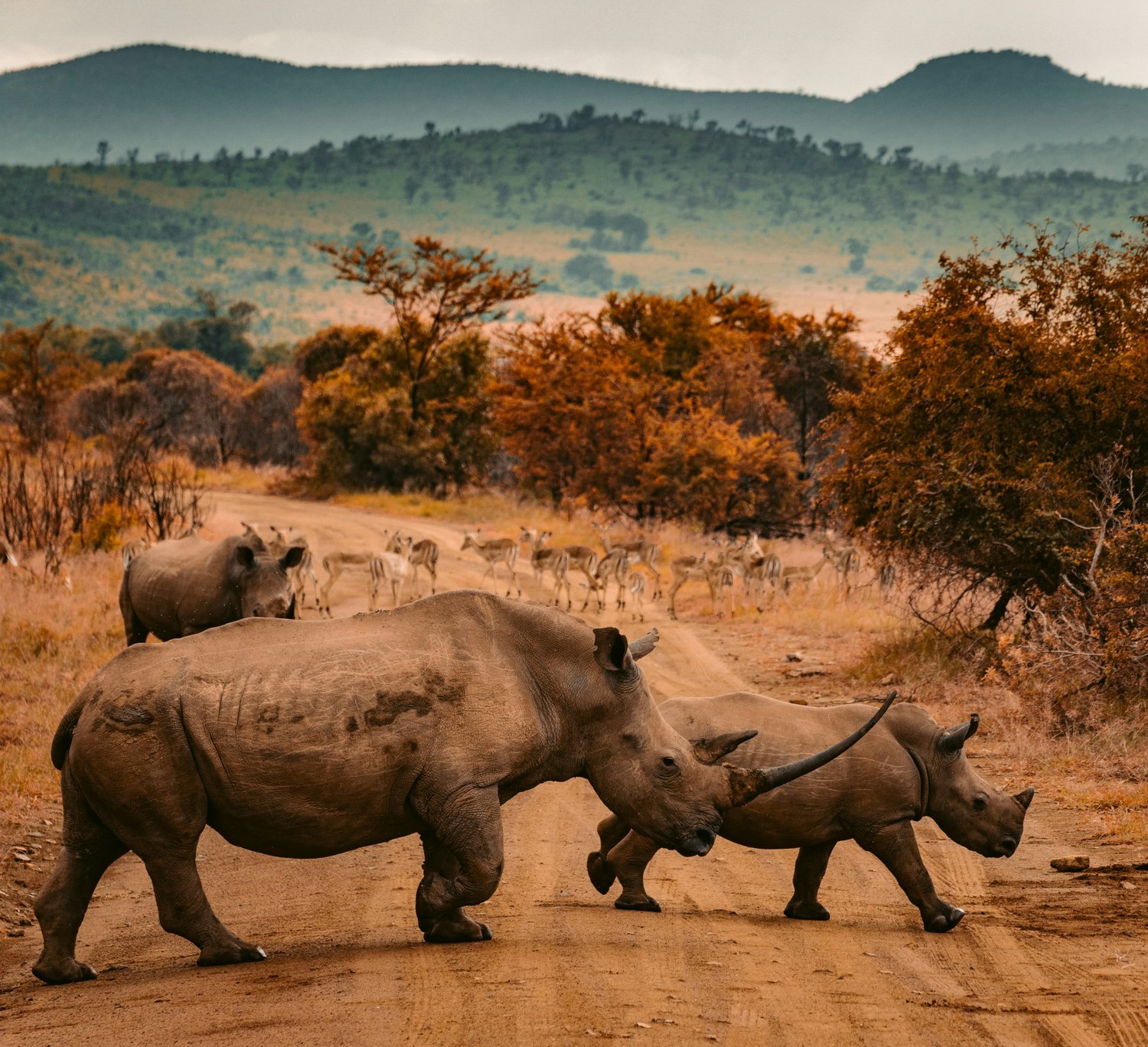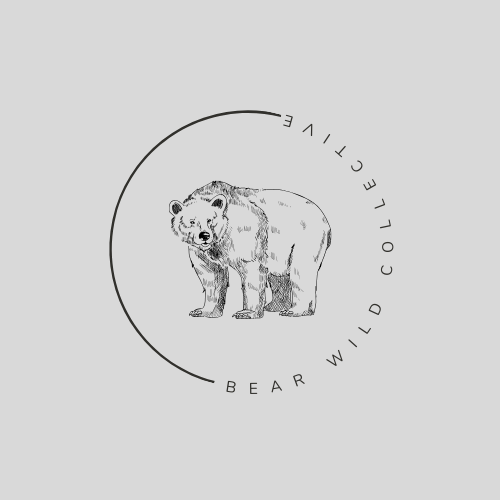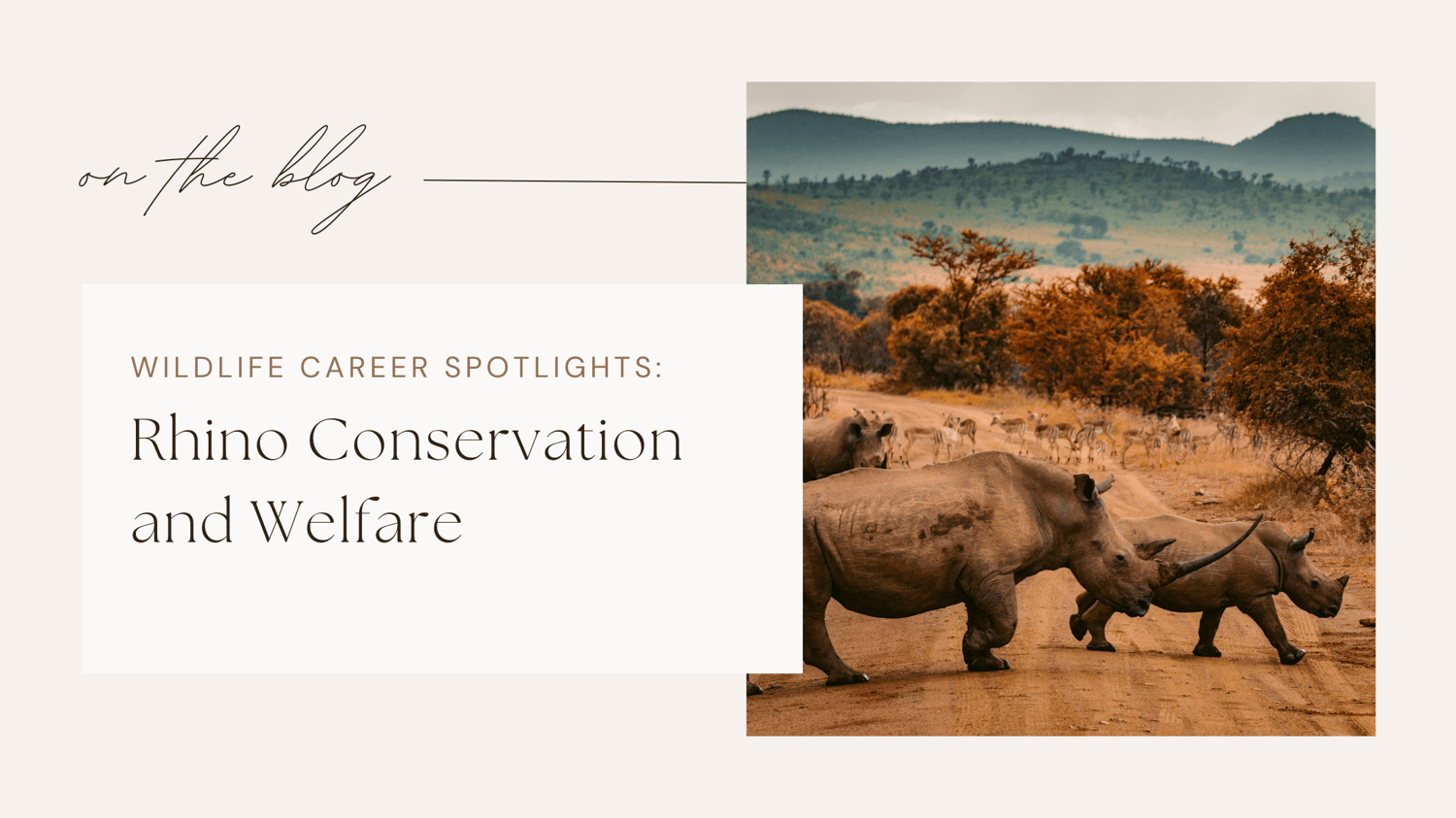Rhinos are some of the world’s most iconic and endangered species, with all five species—white, black, Indian, Javan, and Sumatran rhinos—facing significant threats from poaching, habitat loss, and human-wildlife conflict. Black rhinos are now extinct in the wild - only remaining in captivity, and white rhinos are 'functionally extinct' as only two females survive. As rhinos struggle for survival, a range of career opportunities in conservation and animal welfare are emerging to protect these magnificent creatures. These roles are essential for safeguarding rhinos and their ecosystems.
Read more about unique roles in the wildlife sector in our Wildlife Career Accelerator or Wildlife Work Directory, or below for more info about Rhino conservation and welfare careers.

[Credit Charlie Red]
Leading the charge in rhino protection:
- Save the Rhino International: Save the Rhino works on projects that protect rhinos across Africa and Asia - the organisation focuses on habitat conservation, anti-poaching efforts, and community-based conservation programs.
- The International Rhino Foundation: The IRF is dedicated to the conservation of all rhino species. It focuses on securing wild populations through anti-poaching measures, habitat restoration, and monitoring, as well as supporting captive breeding programs.
- WWF (World Wildlife Fund): WWF’s efforts in rhino conservation are part of its larger global mission to protect endangered species. WWF works on both policy and field conservation, focusing on habitat protection and anti-poaching efforts, particularly in Africa and Asia.
- The African Wildlife Foundation (AWF): AWF is deeply committed to protecting rhinos and other wildlife in Africa. Their conservation efforts include community engagement, anti-poaching programs, and large-scale habitat restoration projects.
- Four Paws: An international animal welfare organisation, Four Paws works on various wildlife issues, including the rescue and rehabilitation of rhinos from captivity. They focus on animal welfare, often campaigning against rhino tourism practices that exploit these animals.
There are a variety of career opportunities for professionals passionate about protecting these incredible animals:
Wildlife Biologist and Field Researcher
Wildlife biologists and researchers are at the forefront of rhino conservation efforts. These professionals collect valuable data on rhino populations, behaviors, and habitats. Fieldwork can include tracking rhinos using GPS collars, conducting population surveys, and studying rhino health. Wildlife biologists also monitor the impact of environmental factors, such as habitat fragmentation or human encroachment, on rhino populations. Researchers collaborate with conservationists, local communities, and governments to develop effective strategies to protect rhinos and restore their natural habitats.
Anti-Poaching and Wildlife Protection Officers
Poaching remains one of the biggest threats to rhinos. Anti-poaching units and wildlife protection officers are crucial to rhino conservation, as they help prevent illegal hunting and trafficking of rhino horn. These roles involve patrolling protected areas, conducting surveillance, and responding to poaching incidents. In addition to enforcing anti-poaching laws, wildlife protection officers also work with local communities to reduce human-wildlife conflict and promote coexistence. Anti-poaching efforts are often supported by technology, such as drones and camera traps, to enhance surveillance and detection.
Conservation Educator and Outreach Specialist
Conservation educators and outreach specialists play a pivotal role in raising public awareness about the importance of rhinos and the threats they face. These professionals work in schools, communities, and media outlets to educate the public on rhino conservation. They might organise awareness campaigns, develop educational materials, and host workshops to promote rhino protection. Public support is crucial for the success of conservation efforts, and educators help build long-term support through advocacy and awareness-building.
Veterinary and Animal Welfare Professionals
Veterinarians and animal welfare specialists working in rhino conservation play a critical role in the health and well-being of rhinos. They are involved in medical care, rehabilitation, and treatment of injured or sick rhinos. Veterinary roles in rhino conservation can also extend to the management of captive rhino populations, ensuring their health while supporting breeding programs. These professionals often collaborate with conservationists to monitor the effects of environmental changes on rhino health.
A career in rhino conservation and animal welfare offers rewarding opportunities for those passionate about protecting endangered species and preserving ecosystems. Whether through field research, wildlife protection, veterinary care, or public education, professionals in the field of rhino conservation play an integral role in ensuring the survival of rhinos across the globe. Organizations such as Save the Rhino, the International Rhino Foundation, WWF, AWF, and Four Paws provide numerous opportunities for individuals interested in making a lasting impact on rhino conservation efforts. These roles contribute directly to rhino protection, helping to ensure that these majestic animals continue to roam our planet for generations to come



